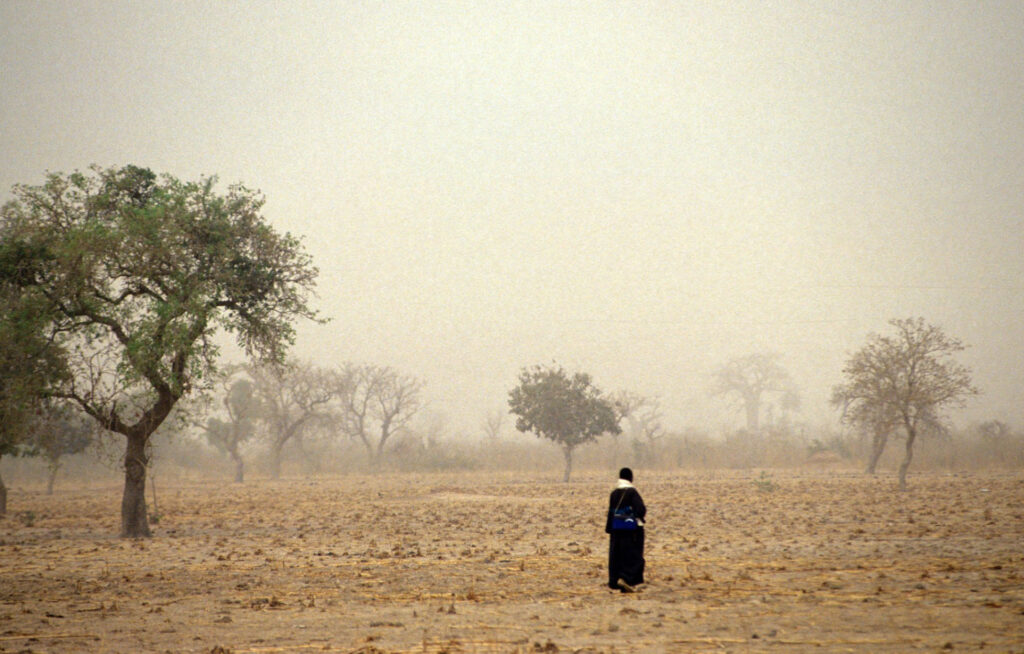By Lauren Schulsohn and Emily Morris
LOS ANGELES — Dire famine in Madagascar, locust invasions driving Ethiopians into food insecurity, devastation from Cyclone Idai in Mozambique – climate change already endangers the lives and livelihoods of people across the African continent. The World Bank predicts 86 million Africans will face climate-caused migration by 2050, an upheaval that could devastate the continental community and economy.
The entire continent only contributes 4% to the global total of greenhouse gas emissions. Yet, its development is most threatened by climate change. As international leaders prepare to discuss environmental policy at COP26, communities across Africa already face the dire repercussions of climate change. Representatives from Africa enter COP26 with various political priorities designed to aid their economies in the transition toward sustainability and fortify their people against the impending onslaught of drought, flood, famine and economic disaster.
At COP26, African leaders President Félix Tshisekedi of the DRC, Ali Bongo Ondimba of Gabon, Uhuru Kenyatta of Kenya, Muhammadu Huhari of Nigeria, and Cyril Ramaphosa of South Africa will be leading the charge to get the African Union and the continent’s countries the support it needs to combat this crisis. In addition to these main players, the leaders of the Republic of Congo, Gabon, Mauritania, Togo, Angola, CAR, Madagascar, Egypt, Sierra Leone, Namibia, Mozambique and Guinea-Bissau will also attend. And even in the face of significant international pressure to participate in this event, some presidents, including those of Senegal, Tunisia, Côte d’Ivoire, Burkina Faso, Benin and Mauritius, have decided to send their environmental ministers in their place. Despite a consensus that COP26 is crucial for the world’s future, discrepancies in commitment and attendance of Africa’s leadership may reflect disillusionment with recent trends in international climate governance.
For many African countries, difficult decisions must be made about the issues the conference poses. As food insecurity, terrorism, displacement, water scarcity and gender inequity persistently plague the continent, impending climate change disaster threatens to exacerbate the existing human suffering. Thus, the intersection between Africa’s sociopolitical issues and imminent environmental catastrophe will take priority for Africa at the upcoming COP26 discussions.
In Glasgow, countries are planning to work together to create a strategy and set goals for adapting to our new world. The AU’s governments already spend 2 to 9% of their GPD to fund adaptation programs and will need additional support and investment from developed countries to make the costly transition to environmentally sustainable infrastructure. The continent is most concerned with the adaptation goals at this conference for developing countries and is looking for the opportunity to address the unique challenges it faces.
There are several issues African nations want to highlight. First, they would like to ensure that developed countries do not burden developing countries with unnecessary obligations to benefit themselves economically. Moreover, they aim to strategize and design their economy so that net-zero emissions are achievable by 2050.
Another critical issue these countries are looking to address is ensuring that developed countries help finance the technology required to make the economic transition toward environmentally stable energy and industrial production. While developed nations will prioritize carbon emission reduction pledges, less developed countries will pursue investment plans to support technological innovation in sustainability sectors.
Although COVID-19 has presented every nation with unprecedented economic challenges, African countries recognize their unique financial constraints and infrastructural underdevelopment demand significant attention from the international community. They will push for additional financial support from developed nations in the upcoming negotiations.
While Africa looks forward to collaborating on larger initiatives and issues that span various continents, it will bargain for increased support for its initiatives, such as the African Renewable Energy Initiative and the African Adaptation Initiative. Africa has received many loans to support these projects, which has created a large debt burden; therefore, it also needs more grants. With COVID-19, the debt burden has taken a toll on the continent, so in order for the continent to combat the climate crisis, it needs increased support. With leaders from the World Bank and the International Monetary Fund present, Africa is hoping for a win.
The economic development of Africa has been a long time goal. For many years, the international community has hoped that Africa can one day be economically, socially and governmentally prosperous. However, climate change poses a distinctive challenge as the continent must be cognizant of the tension between national development goals and international sustainability initiatives. Moreover, climate change has eliminated the paths to development available to more developed nations such as the UK and the U.S. This is critical because Africa’s path toward development will be drastically more challenging and uncharted.
But, with African leaders’ strong consensus and leadership on this issue, the continent can hope to achieve both development and environmental goals at COP26.






